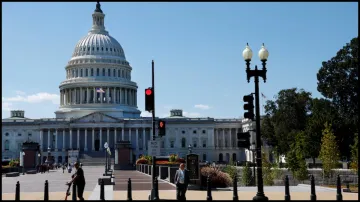US government shutdown imminent? Lawmakers fail to pass stopgap funding bill for six-month extension
Congress needs to pass a stopgap spending bill before October 1, when current funding expires just weeks before the November elections. However, Republicans and Democrats were divided over a voting bill which asked for proof of citizenship from voters.

Washington: Republicans in the US House of Representatives failed to pass a stopgap funding bill on Wednesday to avert a possible government shutdown at the end of the month, amid divided opinions over a controversial voting measure included in the bill by former President and Republican presidential candidate Donald Trump asking for proof of citizenship from voters.
Despite the urging of Trump, House Republicans were unable to muster enough votes to pass the package to pass the package and send it to the Democratic-controlled Senate. With Democrats mostly united in opposition, the bill failed by a vote of 202-220, with 14 Republicans voting against and three Democrats in favour. House Speaker Mike Johnson postponed the vote and said he would craft a new temporary funding bill.
“No vote today because we’re in the consensus-building business here in Congress. With small majorities, that’s what you do,” Johnson told reporters after both parties thwarted his effort to bring a funding bill. “We’re having thoughtful conversations, family conversations within the Republican conference and I believe we’ll get there.”
Why did both parties disagree on the bill?
Congress needs to pass a stopgap spending bill before October 1 to avoid a federal shutdown just weeks before the presidential election in November. The measure had been teed up for a vote on Wednesday afternoon, but Democrats are overwhelmingly opposed and enough Republicans had voiced opposition to raise serious doubts about whether the measure would pass.
Democrats in the House and the Senate say they are eager to pass a stopgap spending bill to avert a disruptive shutdown that would furlough (temporarily suspend) hundreds of thousands of federal workers. However, they opposed the version that Johnson brought to a vote on Wednesday, because it was paired with an unrelated voting bill that would require Americans to provide proof of citizenship when they register to vote and require states to purge non-citizens from their registration lists.
Trump has made illegal immigration a central issue in his re-election bid and has falsely claimed that Democrats are registering illegal immigrants to vote, the latest in a long line of lies about election fraud. However, Johnson also has to contend with a contingent of Republicans who typically vote against stopgap funding bills.
The GOP opponents of the bill argue that it continues spending at levels they consider excessive. And some Republicans simply won’t vote for any continuing resolution, arguing that Congress must return to passing its 12 annual spending bills separately rather than through the one or two catchall bills that have become the norm in recent decades.
What will happen now?
Speaker Johnson said he would push ahead with the crucial components of the bill. He has embraced concerns that some of the migrants who have entered the country at the US-Mexico border in recent years could swing the elections, though it’s illegal for non-citizens to vote and research has shown that such voting is extremely rare.
Democrats are calling on Johnson to “stop wasting time” on a bill that will not become law and to work with them on a short-term spending measure that has support from both parties. At the end of the day, they say no spending bill can pass without bipartisan support and buy-in from a Democratic-led Senate and White House. Trump seemingly encouraged a government shutdown if Republicans in the House and Senate “don’t get assurances on Election Security.”
Senate Republican leader Mitch McConnell disagreed when asked about Trump’s post. “Shutting down the government is always a bad idea, no matter what time of the year it is,” McConnell said. Meanwhile, the US Congress faces an even more critical deadline on January 1, by which time lawmakers will have to raise the nation's debt ceiling or risk defaulting on more than $35 trillion in federal government debt.
(with inputs from agencies)
ALSO READ | False reports of explosives found in car near Trump rally spread online
ALSO READ | 'They are sharpest people, they're at top of their game': Trump praises Indians but vows to impose tariffs